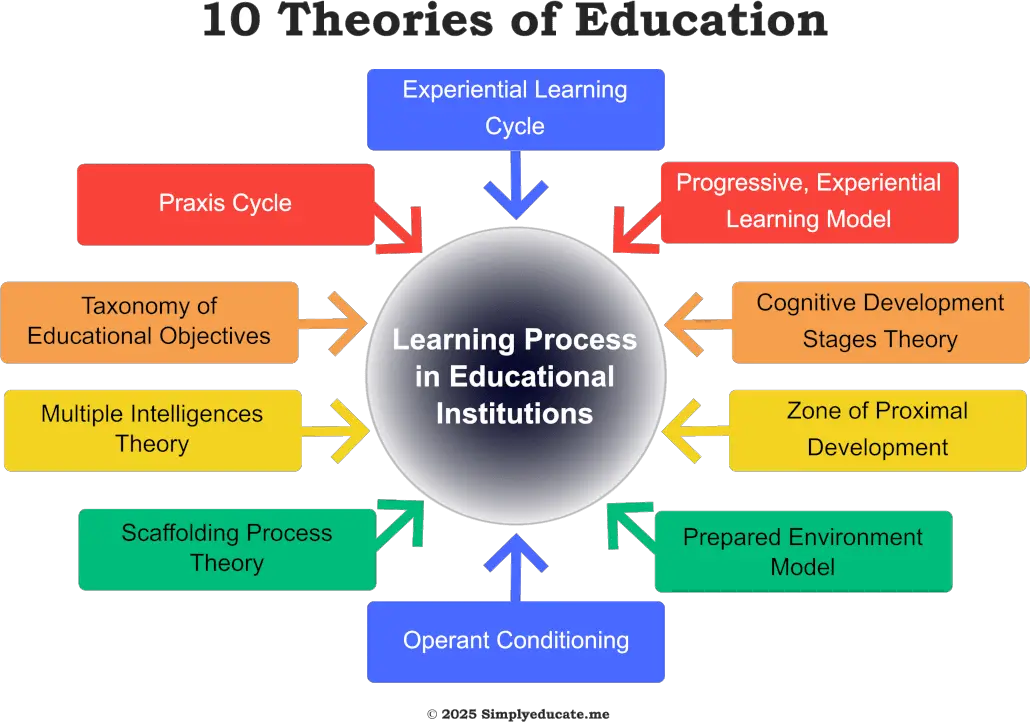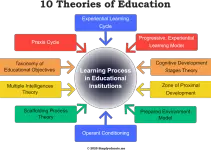Updated | September 22, 2025
This article explains the four major foundations of curriculum and their importance in education. Examples are provided to stress the importance of curriculum in the academe.
Read on and reflect on some experiences you have had in school. Match it with how philosophy, history, psychology, and sociology influence those experiences of yours.
Table of Contents
The Influence of Philosophy to Curriculum
Educators, curriculum makers, and teachers must have espoused a philosophy or philosophies deemed necessary for planning, implementing, and evaluating a school curriculum. The philosophy they have embraced will help them achieve the following:
- define the school’s purpose,
- identify the essential subjects to be taught,
- design the learning students must have,
- develop approaches or methodologies on how students can gain the knowledge, skills, and attitude,
- produce the instructional materials,
- identify the methods and strategies to be used, and
- determine how teachers will evaluate students.
Likewise, philosophy offers solutions to problems by helping the administrators, curriculum planners, and teachers make sound decisions. A person’s philosophy reflects his/her life experiences, social and economic background, shared beliefs, and education.
When John Dewey proposed that “education is a way of life,” his philosophy is realized when put into practice. Now, particularly in the Philippines, Dewey’s philosophy served as an anchor for the country’s educational system.
History and Its Influence to Curriculum
The history of one’s country can affect its educational system and the curriculum. If we trace the curriculum’s formal beginning, we get back in time to Franklin Bobbit’s book entitled “The Curriculum,” published in 1918.
From Bobbit’s time to Tyler, many developments in the purposes, principles, and contents of the curriculum took place. Please read the Six Famous Curriculum Theorists and their Contributions to Education for more information.
Four Major Foundations of Curriculum and the Influence of Psychology
The curriculum is influenced by psychology. Psychology provides information about the teaching and learning process. It also seeks answers how a curriculum will be organized to achieve students’ learning at the optimum level and what amount of information they can absorb in learning the various contents of the curriculum.

The following are four psychological theories in learning that served as major foundations of curriculum development:
1. Behaviorism
Education in the 20th century was dominated by behaviorism. The mastery of the subject is given more emphasis. So, learning is organized in a step-by-step process. Using drills and repetition are common.
For this reason, many educational psychologists viewed it as mechanical and routine. Though many are skeptical about this theory, we can’t deny the influences it had on our educational system.
2. Cognitivism
Cognitive theorists focus on how individuals process information, monitor and manage their thinking. The basic questions cognitive psychologists zero in on are:
- How do learners process and store information?
- How do they retrieve data and generate conclusions?
- How much information can they absorb?
With their beliefs, they promote the development of problem-solving and thinking skills and popularize reflective thinking, creative thinking, intuitive thinking, discovery learning, and others.
3. Humanism
Humanism is taken from Gestalt’s theory, Abraham Maslow’s theory, and Carl Rogers’ theory. This group of psychologists is concerned with the development of human potential.
In this theory, the curriculum is after the process, not the product; focuses on the learners’ personal needs, not on the subject; and clarifies psychological meanings and environmental situations. In short, curriculum views founded on humanism posit that learners are human beings who are affected by their biology, culture, and environment. They are neither machines nor animals.
Curriculum views founded on humanism posit that learners are human beings who are affected by their biology, culture, and environment.

Along this line, curriculum developers must craft a more advanced, more comprehensive curriculum that promotes human potential. Teachers educate not only the minds, but the hearts as well.
4. Sociology and Curriculum
Among the major foundations of curriculum development, the sociological theory emphasizes the influence of society on education. It is founded on the belief that there is a mutual and encompassing relationship between society and curriculum because it exists within the societal context. Though schools are formal institutions that educate the people, other units of society educate or influence the way people think, such as families and friends, and communities.
Since society is dynamic, many developments are difficult to cope with and adjust to. But the schools are made to address and understand the changes not only in one’s country but in the world as well.
Summary and Conclusion
Now, I summarize these four major theories of learning that served as foundations of curriculum development in one matrix below comparing the focus, key idea, how learning occurs, the role of teacher and the role of learner.
| Theory | Focus | Key Idea | How Learning Occurs | Role of Teacher | Role of Learner |
|---|---|---|---|---|---|
| Behaviorism (Pavlov, Skinner, Watson) | Observable behavior | Conditioning through stimulus and response | Reinforcement and punishment shape behavior | Trainer, provider of reinforcement and feedback | Reactor to external stimuli |
| Cognitivism (Piaget, Bruner, Ausubel) | Mental processes | Mind works like a computer; schema building | Information processing, organization, memory use | Organizer, explainer, scaffold of knowledge | Active processor of information |
| Humanism (Maslow, Rogers) | Personal growth and emotions | Learning is self-directed and student-centered | Motivation, self-actualization, and choice drive learning | Facilitator, guide, supportive mentor | Self-motivated, responsible for own learning |
| Sociocultural Theory (Vygotsky) | Social interaction and culture | Learning occurs in social context | Collaboration, language, Zone of Proximal Development | Scaffolder, encourages collaboration | Co-creator of knowledge within a community |
Therefore, schools must be relevant by making their curriculum more innovative and interdisciplinary. A curriculum that can address global learners’ diversities, the explosion of knowledge through the internet, and the educational reforms and policies recommended or mandated by the United Nations.
However, it is also imperative that a country must have maintained a curriculum that reflects and preserves its culture and aspirations for national identity. No matter how far people go, it is the country’s responsibility to ensure that the school serves its purpose of educating the citizenry.
Now, it is your time to reflect. Can you think of your experiences in which the major foundation of the curriculum can explain it?
Try to ask yourself the following questions:
- Why should I take history, philosophy, psychology or even PE subjects in college?
- Why is it that the Department of Education is implementing K to 12 and the mother tongue-based curriculum?
- Why is there institutional amalgamation?
- Why is there “One UP” (One University of the Philippines) now in the Philippines?
- Why is there a need for a globalized higher education?
These questions imply that change will take place soon. So, brace yourself for the many changes that will take place in education!
Related Post
This article presents 10 of the major theories of education including a description of the theory with diagrams and contributions to the development of education as we know today.

Frequently Asked Questions (FAQ)
1. Why is philosophy important in curriculum development?
Philosophy provides the foundation for curriculum planning, implementation, and evaluation. It helps define the school’s purpose, choose subjects, design learning activities, and guide teaching methods. Without philosophy, curriculum decisions would lack direction and coherence.
2. How does philosophy influence what subjects are taught?
The philosophy embraced by a school determines which knowledge and skills are considered essential. For example, a progressivist philosophy influenced by John Dewey emphasizes problem-solving, critical thinking, and real-life learning experiences.
3. What is the relationship between history and curriculum?
History shapes curriculum by showing how educational purposes and content evolved over time. For instance, Franklin Bobbit’s The Curriculum (1918) and Ralph Tyler’s principles influenced how schools structured learning objectives, content, and assessments.
4. How does psychology affect curriculum design?
Psychology explains how students learn, which guides curriculum structure and teaching strategies. Behaviorism emphasizes drills and reinforcement, Cognitivism stresses information processing, Humanism highlights personal growth, and Sociocultural theory values social interaction and collaboration.
5. What role does sociology play in curriculum development?
Sociology examines the relationship between society and education. A curriculum must respond to cultural values, community needs, and social changes. It ensures that schools prepare students not just for personal success but also for active participation in society.
6. Who are the major theorists behind the foundations of curriculum?
Key contributors include John Dewey (philosophy and progressivism), Franklin Bobbit and Ralph Tyler (history of curriculum), Pavlov, Skinner, and Watson (behaviorism), Piaget, Bruner, and Ausubel (cognitivism), Maslow and Rogers (humanism), and Vygotsky (sociocultural theory).
7. How is the Philippine curriculum influenced by these foundations?
The Philippine K to 12 program and mother tongue-based curriculum are influenced by philosophy, psychology, and sociology. Dewey’s progressivism guided experiential learning, while sociocultural principles shaped community-based and culturally responsive education policies.
8. Why must the curriculum be continuously updated?
Society and knowledge are dynamic. The internet, globalization, and United Nations educational reforms require schools to make their curriculum innovative, interdisciplinary, and globally competitive, while still preserving national identity and culture.
Reference
Bilbao, P. P., Lucido, P. I., Iringan, T. C., and R. B. Javier (2008). Curriculum development. Quezon City: Lorimar Publishing, Inc.
© 2015 January 9 M. G. Alvior




Thank you Doc for your productive and important research on the four major curriculum foundations and their importance on learning and teaching processes. Please, let us continue building and researching more and adding more flesh to these important Theories such as Abraham Maslow’s theory, and many more so that education becomes more meaningful our citizens. Thanks.
Dr. MARSHAL Mayuniyuni, from ZAMBIA.
Thank you for making this information accessible. This help me in my journey of developing a curriculum.
Thank you for helping me access this information. This is timely and very important.
Hai i’m Merry Ann and Bsed student can I have your ideas regarding on How you will examine closely how language-in-education policies are made?
Can I ask what is the influence of these curriculum foundation to the students?
Hello! I think it is more on the subjects being taught to the students. Unconsciously, they are influenced by the way history is being taught to them; the way they should interact with others as perceived by their communities; the way they view things as influenced by the philosophical views that are introduced to them; and the way psychology is presented – it will lead to the kind of life they would take in the future.
Question:
Why do psychology, sociology and anthropology, and philosophy serve as the CURRICULUM FOUNDATIONS?
What are the importance of including the structure of the different thought of philosophy, psychology, sociology and history and how these affect in the attainment of k to 12 curriculum goal and it’s relationship to the national and global development?
Hello Meh. Sorry for late reply. These 4 foundations are badly needed to be taught to our students in order to develop our country and the world. One of the goals is nation building. How can we develop our country if we don’t know our history, social structures, philosophies and psychological perspectives. For global development, we need to carefully interact with them. If we don’t know these four foundations in the international level, we can no longer achieve the goals in MDP and SGD, to name a few.
What are the importance of including in the structure the different thought of philosophy, sociology and history and how these affect and how these affect in the attainment of k to 12 curriculum goal and its relationship to the national and global decelopnent.?
could you please sent some historical information on reconstructionism educational philosophy
1. Identify which among the foundations of curriculum has influenced what you have learned in school as a college student?
Thanks so much. Really useful.
Very good article
It really help beginners who are in the process of curriculum studies to understand the basics of curriculum development
awesome